莫扎特英语介绍生平
介绍音乐家莫扎特英语作文

介绍音乐家莫扎特英语作文Mozart was a renowned Austrian composer who lived during the Classical era of music. Born in 1756 in Salzburg, he was a child prodigy who began playing the harpsichord and violin at a very young age. His father, Leopold Mozart, was a talented musician and teacher who recognized his son's exceptional talent and dedicated his life to nurturing and promoting his musical abilities.From a young age, Mozart displayed an extraordinary aptitude for music. He composed his first piece at the age of five and by the time he was six, he was performing for European royalty. His early travels with his family exposed him to a wide range of musical styles and influences, which he would later incorporate into his own compositions.One of the most remarkable aspects of Mozart's career was his prolific output. He composed over 600 works, including symphonies, concertos, operas, and chamber music, all of which are renowned for their technical mastery, emotional depth, and enduring popularity. His operas, such as "The Magic Flute," "The Marriage of Figaro," and "Don Giovanni," are considered some of the greatest works in the genre, and have remained in the repertoire of opera houses aroundthe world.Mozart's music is characterized by its elegance, grace, and balance, reflecting the aesthetic ideals of the Classical era. His compositions are known for their melodic beauty, harmonic complexity, and intricate orchestration. He was a master of form, and his works often follow traditional structures such as the sonata, rondo, and concerto, while infusing them with his own unique creative flair.Beyond his technical prowess, Mozart's music is also renowned for its emotional expressiveness. His compositions are capable of evoking a wide range of feelings, from the joyful and playful to the melancholic and introspective. This ability to connect with the listener on a deep emotional level is one of the hallmarks of his genius.Throughout his life, Mozart faced numerous challenges and setbacks, including financial struggles, poor health, and a lack of recognition from the Viennese aristocracy. Despite these obstacles, he remained dedicated to his craft and continued to produce an astounding volume of high-quality work. His untimely death at the age of 35 was a tragedy, but his legacy as one of the greatest composers in history has endured.Today, Mozart's music is more popular than ever, with his works being performed and recorded by orchestras, chamber ensembles,and soloists around the world. His influence can be seen in the works of countless composers who have followed in his footsteps, and his legacy continues to inspire and captivate audiences of all ages.In conclusion, Wolfgang Amadeus Mozart was a true musical genius whose contributions to the world of classical music are unparalleled. His enduring legacy and the timeless beauty of his compositions continue to inspire and delight music lovers around the globe.。
莫扎特简介中英双语
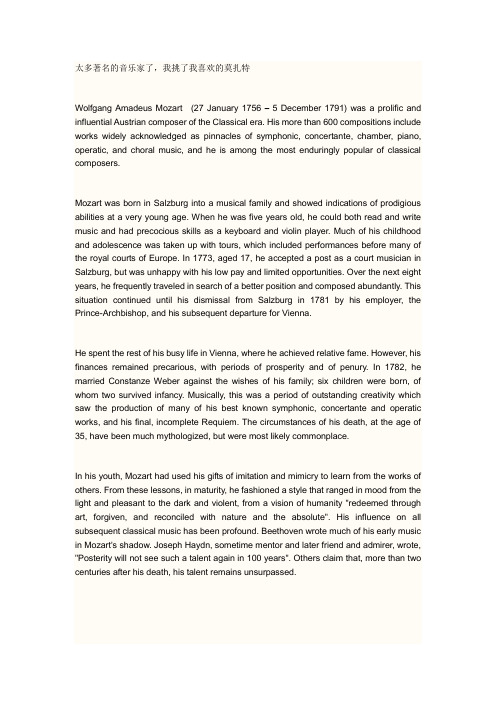
太多著名的音乐家了,我挑了我喜欢的莫扎特Wolfgang Amadeus Mozart (27 January 1756 – 5 December 1791) was a prolific and influential Austrian composer of the Classical era. His more than 600 compositions include works widely acknowledged as pinnacles of symphonic, concertante, chamber, piano, operatic, and choral music, and he is among the most enduringly popular of classical composers.Mozart was born in Salzburg into a musical family and showed indications of prodigious abilities at a very young age. When he was five years old, he could both read and write music and had precocious skills as a keyboard and violin player. Much of his childhood and adolescence was taken up with tours, which included performances before many of the royal courts of Europe. In 1773, aged 17, he accepted a post as a court musician in Salzburg, but was unhappy with his low pay and limited opportunities. Over the next eight years, he frequently traveled in search of a better position and composed abundantly. This situation continued until his dismissal from Salzburg in 1781 by his employer, the Prince-Archbishop, and his subsequent departure for Vienna.He spent the rest of his busy life in Vienna, where he achieved relative fame. However, his finances remained precarious, with periods of prosperity and of penury. In 1782, he married Constanze Weber against the wishes of his family; six children were born, of whom two survived infancy. Musically, this was a period of outstanding creativity which saw the production of many of his best known symphonic, concertante and operatic works, and his final, incomplete Requiem. The circumstances of his death, at the age of 35, have been much mythologized, but were most likely commonplace.In his youth, Mozart had used his gifts of imitation and mimicry to learn from the works of others. From these lessons, in maturity, he fashioned a style that ranged in mood from the light and pleasant to the dark and violent, from a vision of humanity "redeemed through art, forgiven, and reconciled with nature and the absolute". His influence on all subsequent classical music has been profound. Beethoven wrote much of his early music in Mozart's shadow. Joseph Haydn, sometime mentor and later friend and admirer, wrote, "Posterity will not see such a talent again in 100 years". Others claim that, more than two centuries after his death, his talent remains unsurpassed.沃尔夫冈·阿玛多伊斯·莫扎特(Wolfgang Amadeus Mozart,1756-1791)莫扎特是一位杰出的奥地利作曲家,出生于萨尔兹堡一个宫廷乐师家里。
莫扎特的生平事迹英语作文

莫扎特的生平事迹英语作文Wolfgang Amadeus Mozart, one of the most influential and celebrated composers of the classical era, lived a life filled with remarkable accomplishments and tragic struggles. Born in Salzburg, Austria on January 27, 1756, Mozart displayed exceptional musical talent from a young age, receiving early training from his father, Leopold Mozart, a renowned composer and music teacher.沃尔夫冈·阿马德乌斯·莫扎特是古典时代最具影响力和著名的作曲家之一,生平充满了卓越的成就和悲惨的挣扎。
1756年1月27日出生于奥地利萨尔茨堡,莫扎特从小就显示出非凡的音乐天赋,得到父亲利奥波德·莫扎特的早期培训,后者是一位著名的作曲家和音乐教师。
By the age of six, Mozart was already proficient in playing the piano and violin, and he amazed audiences with his exceptional skills during concert tours throughout Europe. His early compositions, including symphonies, operas, and chamber music, demonstrated his prodigious talent and mastery of musical forms.六岁的莫扎特已经熟练地演奏钢琴和小提琴,并在整个欧洲的音乐会巡回演出中以他的非凡技能惊艳了观众。
莫扎特介绍英文作文
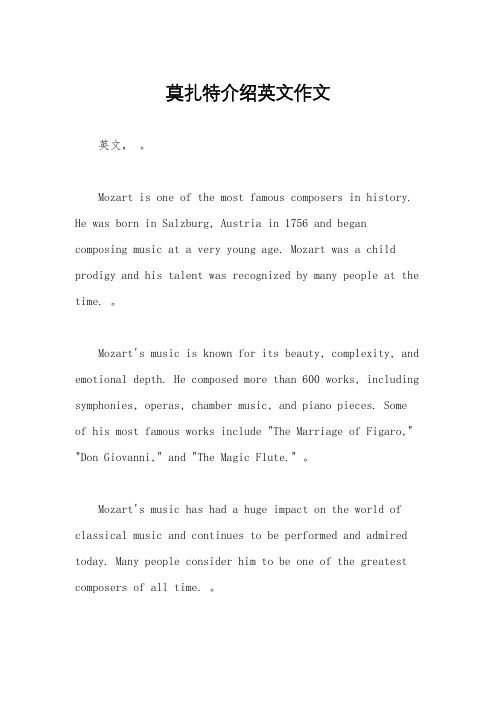
莫扎特介绍英文作文英文,。
Mozart is one of the most famous composers in history. He was born in Salzburg, Austria in 1756 and began composing music at a very young age. Mozart was a child prodigy and his talent was recognized by many people at the time. 。
Mozart's music is known for its beauty, complexity, and emotional depth. He composed more than 600 works, including symphonies, operas, chamber music, and piano pieces. Some of his most famous works include "The Marriage of Figaro," "Don Giovanni," and "The Magic Flute." 。
Mozart's music has had a huge impact on the world of classical music and continues to be performed and admired today. Many people consider him to be one of the greatest composers of all time. 。
中文:莫扎特是历史上最著名的作曲家之一。
他于1756年出生在奥地利的萨尔茨堡,并在很小的时候开始创作音乐。
莫扎特是一个神童,他的天赋被当时许多人所认可。
介绍莫扎特英语作文加翻译
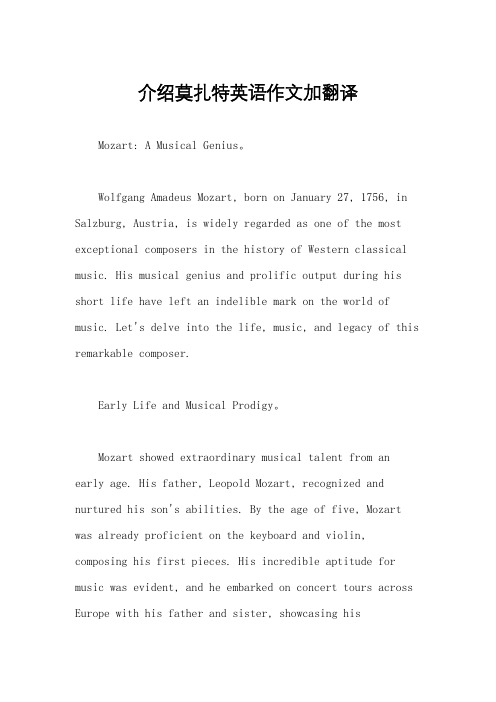
介绍莫扎特英语作文加翻译Mozart: A Musical Genius。
Wolfgang Amadeus Mozart, born on January 27, 1756, in Salzburg, Austria, is widely regarded as one of the most exceptional composers in the history of Western classical music. His musical genius and prolific output during his short life have left an indelible mark on the world of music. Let's delve into the life, music, and legacy of this remarkable composer.Early Life and Musical Prodigy。
Mozart showed extraordinary musical talent from an early age. His father, Leopold Mozart, recognized and nurtured his son's abilities. By the age of five, Mozart was already proficient on the keyboard and violin, composing his first pieces. His incredible aptitude for music was evident, and he embarked on concert tours across Europe with his father and sister, showcasing hisremarkable abilities to astonished audiences.Musical Mastery。
英语作文莫扎特一生
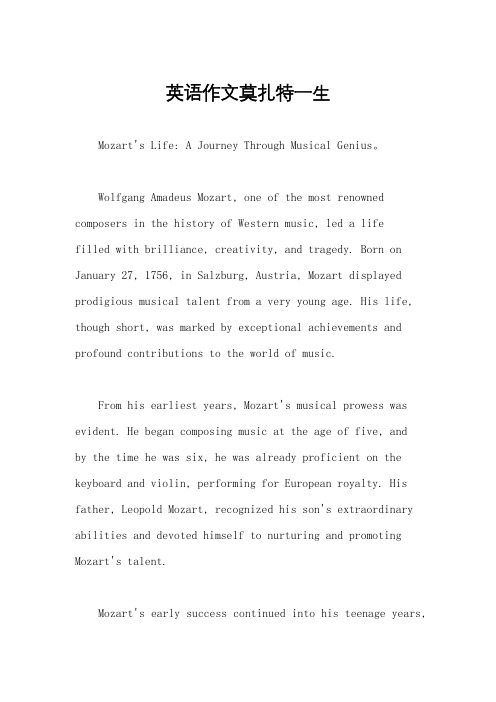
英语作文莫扎特一生Mozart's Life: A Journey Through Musical Genius。
Wolfgang Amadeus Mozart, one of the most renowned composers in the history of Western music, led a lifefilled with brilliance, creativity, and tragedy. Born on January 27, 1756, in Salzburg, Austria, Mozart displayed prodigious musical talent from a very young age. His life, though short, was marked by exceptional achievements and profound contributions to the world of music.From his earliest years, Mozart's musical prowess was evident. He began composing music at the age of five, andby the time he was six, he was already proficient on the keyboard and violin, performing for European royalty. His father, Leopold Mozart, recognized his son's extraordinary abilities and devoted himself to nurturing and promoting Mozart's talent.Mozart's early success continued into his teenage years,as he embarked on tours across Europe with his father and sister, showcasing his skills as a composer and performer. These travels exposed him to a wide range of musical styles and cultures, enriching his own compositions with diverse influences.At the age of 17, Mozart was appointed as a musician in the court of Archbishop Colloredo in Salzburg. Despite the prestige of this position, Mozart grew increasingly frustrated with the limitations it imposed on his creative freedom. He longed to compose operas and symphonies on a grand scale, aspirations that could not be fully realized within the confines of his role in Salzburg.In 1781, Mozart made the bold decision to leave Salzburg and seek his fortune in Vienna, then the thriving cultural capital of Europe. Vienna proved to be a fertile ground for Mozart's creativity, and he quickly established himself as a prominent figure in the city's musical scene. His operas, including "The Marriage of Figaro," "Don Giovanni," and "The Magic Flute," were met with widespread acclaim and cemented his reputation as a master of thegenre.Despite his professional success, Mozart's personallife was marked by financial struggles and emotional turmoil. He married Constanze Weber in 1782, and the couple faced constant financial difficulties, exacerbated by Mozart's extravagant lifestyle and his inability to manage his finances effectively.Tragically, Mozart's life was cut short at the age of 35 when he succumbed to an illness that has been the subject of much speculation and debate among historians and medical experts. His death on December 5, 1791, left the world bereft of one of its greatest musical geniuses, but his legacy endures through his vast body of work, which continues to inspire and enchant audiences to this day.In conclusion, Wolfgang Amadeus Mozart's life was a testament to the power of artistic genius and the enduring impact of music on the human spirit. Despite facing numerous challenges and setbacks, Mozart's unparalleledtalent and creativity shone brightly, leaving an indelible mark on the world of music that will never be forgotten.。
莫扎特的生平事迹英语作文

莫扎特的生平事迹英语作文Wolfgang Amadeus Mozart, born on January 27, 1756, in Salzburg, Austria, was a musical prodigy who revolutionized the world of classical music. His exceptional talent and prolific output have left an indelible mark on the annals of music history.Mozart's early life was filled with promise. He showed remarkable musical ability from a very young age, often composing and performing for his family and friends. His father, Leopold Mozart, a respected violinist and composer, recognized his son's天赋 and decided to nurture it. Leopold took Wolfgang and his sister on a European tour, where the young Mozart performed before royal courts and delighted audiences with his musical prowess.Despite the demands of the tour, Mozart's creativity flourished. He composed over 200 works during his teenage years, including symphonies, chamber music, and piano concertos. His music was already distinctively his own, displaying a unique blend of melody, harmony, and structure that set him apart from his contemporaries.Mozart's adult life was filled with both triumphs and challenges. He found success as a composer and performer in Vienna, the musical capital of Europe. His works were performed regularly at the court of Emperor Joseph II, and he established himself as one of the most sought-after composers of his generation.However, Mozart's personal life was often tumultuous. He struggled with financial difficulties, dealt with the loss of loved ones, and faced professional rivalries that took a toll on his mental health. Despite these challenges, he continued to compose, producing works that were increasingly complex and profound.One of Mozart's most famous compositions is the opera "Don Giovanni," which premiered in 1787. This work showcases Mozart's mastery of music drama, combining powerful melodies with intricate orchestral textures. "Don Giovanni" remains a staple of the opera repertory today, testament to Mozart's enduring influence.Mozart's final years were marked by a decline in his health and a tragic turn of events. In 1791, he composed his final work, "Requiem in D minor," a poignant testamentto his own mortality. Tragically, Mozart died on December 5, 1791, at the age of 35, leaving the world in mourning for a musical genius who had touched the hearts of millions.Mozart's legacy is one that has transcended time. His music continues to inspire and delight listeners across the globe. His contributions to the field of classical musicare immeasurable, and his influence on subsequent generations of composers is profound. Mozart's remarkablelife and musical genius are a testament to the power of creativity and the enduring impact of art.**莫扎特非凡的一生与音乐天才**1756年1月27日,沃尔夫冈·阿马德乌斯·莫扎特出生于奥地利萨尔茨堡,这位音乐神童彻底改变了古典音乐的格局。
莫扎特英文介绍【精品】
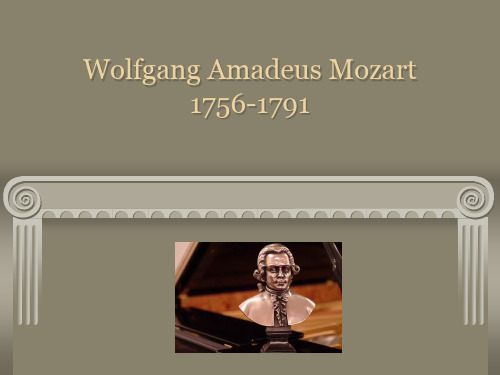
Leopold Mozart
Very respected composer and violinist
Leopold Mozart, 1765.
First composition age 5 transcribed by Leopold Later composition age 6
Mozart played for kings and queens.
Mozart’s Music
Favored the piano Concertos written for his performance Later symphonies considered his best Operas
Mozart’s music was meant to be fun and entertaining.
Mozart & Opera
Opera problems
1. ―stock‖characters 2. plots about mythology, gods, aristocracy
Mozart’s solutions:
characters have real, believable personalities plots about real-life middle class characters continuous flow arias and recitatives blended together style, orchestration, harmony, melody--all contribute to setting mood & adding depth to characters
The Mozart Family
英语作文介绍莫扎特

英语作文介绍莫扎特Mozart, the Legendary ComposerWolfgang Amadeus Mozart, born on January 27, 1756, in Salzburg, Austria, is widely regarded as one of the greatest composers in the history of music. His prodigious talent and extraordinary contributions to the classical music genre have cemented his legacy as a true genius and a pivotal figure in the development of Western music.From a young age, Mozart's musical abilities were evident. He began playing the harpsichord at the age of three and composed his first piece at the age of five. His father, Leopold Mozart, was a renowned composer and music teacher who recognized his son's exceptional talent and dedicated himself to nurturing and cultivating it. Mozart's early years were marked by extensive travel throughout Europe, where he performed for royalty and captivated audiences with his virtuosic skills.One of the most remarkable aspects of Mozart's life was his sheer prolificacy. During his relatively short lifespan of just 35 years, he composed an astounding number of works across various genres,including operas, symphonies, concertos, chamber music, and sacred music. His operas, in particular, are considered masterpieces of the genre, blending captivating storytelling with sublime music. Works such as "The Magic Flute," "Don Giovanni," and "The Marriage of Figaro" are still widely performed and celebrated today, showcasing Mozart's profound understanding of the human experience and his ability to create music that resonates deeply with audiences.Beyond his technical mastery, Mozart's compositions are renowned for their emotional depth and expressive power. His music often captures the full range of human emotions, from the joyful and exuberant to the melancholic and introspective. This ability to evoke and convey profound emotional responses is a testament toMozart's artistic genius and his profound understanding of the human condition.One of the most remarkable aspects of Mozart's legacy is the enduring influence he has had on the development of classical music. His works have served as a benchmark for subsequent composers, who have sought to emulate his technical prowess, melodic genius, and emotional resonance. The impact of Mozart's music can be heard in the compositions of Beethoven, Haydn, and countless others who have been inspired by his timeless creations.Despite the immense success and acclaim he achieved during hislifetime, Mozart's life was not without its challenges. He faced financial struggles, personal tragedies, and the constant pressure of maintaining a prolific output. However, these challenges only served to deepen the emotional depth and artistic expression of his music, as he channeled his experiences into his compositions.Today, Mozart's legacy continues to inspire and captivate audiences around the world. His music is widely performed in concert halls, opera houses, and recital venues, and his influence can be heard in a wide range of musical genres, from classical to contemporary. The enduring popularity and reverence for Mozart's work is a testament to the timeless and universal appeal of his art.In conclusion, Wolfgang Amadeus Mozart stands as one of the most influential and beloved composers in the history of music. His prodigious talent, emotional depth, and technical mastery have cemented his place as a true genius and a towering figure in the classical music tradition. Through his enduring legacy, Mozart's music continues to touch the hearts and minds of people around the world, inspiring new generations of musicians and music lovers alike.。
莫扎特生平英语作文
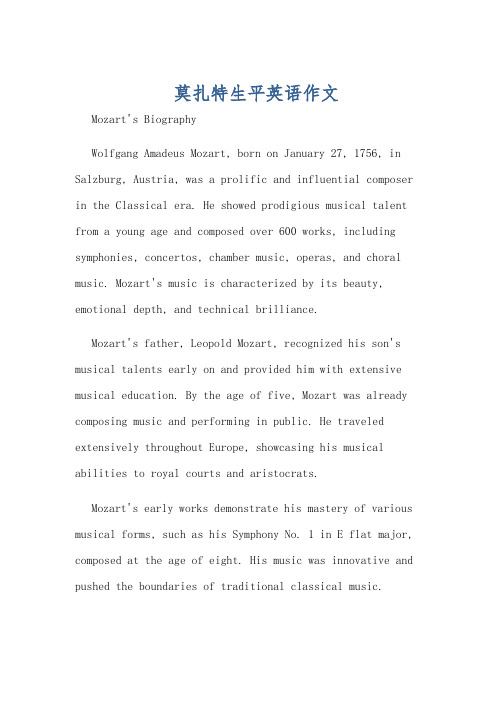
莫扎特生平英语作文Mozart's BiographyWolfgang Amadeus Mozart, born on January 27, 1756, in Salzburg, Austria, was a prolific and influential composer in the Classical era. He showed prodigious musical talent from a young age and composed over 600 works, including symphonies, concertos, chamber music, operas, and choral music. Mozart's music is characterized by its beauty, emotional depth, and technical brilliance.Mozart's father, Leopold Mozart, recognized his son's musical talents early on and provided him with extensive musical education. By the age of five, Mozart was already composing music and performing in public. He traveled extensively throughout Europe, showcasing his musical abilities to royal courts and aristocrats.Mozart's early works demonstrate his mastery of various musical forms, such as his Symphony No. 1 in E flat major, composed at the age of eight. His music was innovative and pushed the boundaries of traditional classical music.Mozart's compositions often feature intricate melodies, complex harmonies, and dramatic contrasts.In 1781, Mozart moved to Vienna, where he hoped to establish himself as a composer. During this time, he composed some of his most famous works, including the opera "The Marriage of Figaro" and the symphony "Jupiter." However, despite his musical genius, Mozart struggled financially throughout his life. He relied heavily on commissions and patronage, which were not always reliable sources of income.Mozart's personal life was also marked by challenges and tragedy. He married Constanze Weber in 1782, and they hadsix children, but only two survived infancy. Mozart'shealth deteriorated in his later years, and he died at the age of 35 on December 5, 1791, in Vienna. The exact causeof his death remains unknown.Mozart's legacy as a composer is unparalleled. His music continues to captivate audiences worldwide and is widely regarded as some of the greatest in classical music history. His operas, such as "The Magic Flute" and "Don Giovanni," are still performed regularly in opera houses around theworld. Mozart's contributions to the development ofclassical music are immeasurable, and his influence can be felt in the works of composers who followed him.莫扎特的生平沃尔夫冈·阿马德乌斯·莫扎特出生于1756年1月27日,奥地利萨尔茨堡,是古典时期一位多产且有影响力的作曲家。
莫扎特英文简介
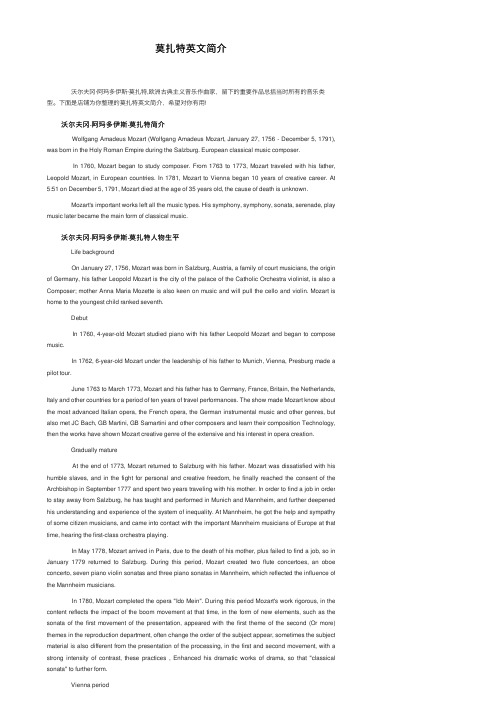
莫扎特英⽂简介 沃尔夫冈·阿玛多伊斯·莫扎特,欧洲古典主义⾳乐作曲家,留下的重要作品总括当时所有的⾳乐类型。
下⾯是店铺为你整理的莫扎特英⽂简介,希望对你有⽤! 沃尔夫冈·阿玛多伊斯·莫扎特简介 Wolfgang Amadeus Mozart (Wolfgang Amadeus Mozart, January 27, 1756 - December 5, 1791), was born in the Holy Roman Empire during the Salzburg. European classical music composer. In 1760, Mozart began to study composer. From 1763 to 1773, Mozart traveled with his father, Leopold Mozart, in European countries. In 1781, Mozart to Vienna began 10 years of creative career. At 5:51 on December 5, 1791, Mozart died at the age of 35 years old, the cause of death is unknown. Mozart's important works left all the music types. His symphony, symphony, sonata, serenade, play music later became the main form of classical music. 沃尔夫冈·阿玛多伊斯·莫扎特⼈物⽣平 Life background On January 27, 1756, Mozart was born in Salzburg, Austria, a family of court musicians, the origin of Germany, his father Leopold Mozart is the city of the palace of the Catholic Orchestra violinist, is also a Composer; mother Anna Maria Mozette is also keen on music and will pull the cello and violin. Mozart is home to the youngest child ranked seventh. Debut In 1760, 4-year-old Mozart studied piano with his father Leopold Mozart and began to compose music. In 1762, 6-year-old Mozart under the leadership of his father to Munich, Vienna, Presburg made a pilot tour. June 1763 to March 1773, Mozart and his father has to Germany, France, Britain, the Netherlands, Italy and other countries for a period of ten years of travel performances. The show made Mozart know about the most advanced Italian opera, the French opera, the German instrumental music and other genres, but also met JC Bach, GB Martini, GB Samartini and other composers and learn their composition Technology, then the works have shown Mozart creative genre of the extensive and his interest in opera creation. Gradually mature At the end of 1773, Mozart returned to Salzburg with his father. Mozart was dissatisfied with his humble slaves, and in the fight for personal and creative freedom, he finally reached the consent of the Archbishop in September 1777 and spent two years traveling with his mother. In order to find a job in order to stay away from Salzburg, he has taught and performed in Munich and Mannheim, and further deepened his understanding and experience of the system of inequality. At Mannheim, he got the help and sympathy of some citizen musicians, and came into contact with the important Mannheim musicians of Europe at that time, hearing the first-class orchestra playing. In May 1778, Mozart arrived in Paris, due to the death of his mother, plus failed to find a job, so in January 1779 returned to Salzburg. During this period, Mozart created two flute concertoes, an oboe concerto, seven piano violin sonatas and three piano sonatas in Mannheim, which reflected the influence of the Mannheim musicians. In 1780, Mozart completed the opera "Ido Mein". During this period Mozart's work rigorous, in the content reflects the impact of the boom movement at that time, in the form of new elements, such as the sonata of the first movement of the presentation, appeared with the first theme of the second (Or more) themes in the reproduction department, often change the order of the subject appear, sometimes the subject material is also different from the presentation of the processing, in the first and second movement, with a strong intensity of contrast, these practices , Enhanced his dramatic works of drama, so that "classical sonata" to further form. Vienna period In June 1781, Mozart could no longer endure the humiliation of the Archbishop, decided to resign to the Archbishop, became the first European history to get rid of the court of musicians, to make a living in Vienna. After he was nominally a freelance composer, he was still unable to resist the oppression of the feudal society. The suffering of life has had a profound impact on his thoughts and creations, and in Vienna for 10 years, he has been the most important of his creation for 10 years. July 1782, Mozart created the "harem escaped" in the Vienna Borg Theater premiere. In 1784, he participated in the Freemasonry, which he preached the freedom, equality, fraternity ideas have a strong resonance, and in this idea inspired the creation of new works. In 1785, once the collapse of the Vienna Folk Opera House began to recover, Mozart has engaged in opera creation opportunities, created a comedy opera "theater manager". In 1786, the creation of opera "Figaro wedding". In 1787, Mozart completed the opera "Don Juan". In January 1790, Mozart's opera "woman's heart" staged. In 1791, Mozart created the opera "Tito's kindness" but was unsuccessful. In September, complete the last opera "Magic Flute". After Mozart began to create large-scale religious music works "Requiem", at 5:55 on December 5 "Requiem" has not yet completed Mozart on the bizarre death, at the age of 35, buried in Vienna.莫扎特英⽂简介。
莫扎特英文简介

莫扎特英文简介Wolfgang Amadeus Mozart, also known as simply Mozart, is one of the most influential and renowned composers in the history of classical music. Born on January 27, 1756, in Salzburg, Austria, Mozart showed prodigious musical talent from an early age and went on to compose over 600 works that included symphonies, concertos, chamber music, operas, and choral music. His compositions were characterized by their complexity, beauty, and emotional depth, and his genius continues to inspire and captivate listeners to this day.Mozart was born into a musical family, his father Leopold being a well-known composer and violinist, and his older sister Maria Anna, also known as Nannerl, being a talented pianist. Leopold recognized his son's extraordinary abilities from an early age and became his first music teacher. Mozart's talent was evident from his earliest compositions, and by the age of five, he was already performing to audiences across Europe.In his short life of just 35 years, Mozart demonstrated an incredible mastery of various musical forms and genres. He composed his first symphony at the age of eight, his first opera at the age of 12, and his first full-scale oratorio at the age of 13. His musical output covered a wide range of styles, from light and playful compositions, such as his serenades and divertimenti, to intense and dramatic works, such as his symphonies and concertos. Mozart's compositions are notable for their technical brilliance, innovative structures, and emotional expressiveness. He was a prolific composer, and his works encompass nearly every musicalform of his time. His symphonies, including the famous Symphony No. 40 and Symphony No. 41 (also known as the "Jupiter" Symphony), show his command of orchestration and his ability to create powerful and memorable melodies. His concertos, such as his Piano Concerto No. 21 in C major and Clarinet Concerto in A major, showcase his virtuosic piano skills and his ability to write music that is both technically challenging and emotionally engaging.Mozart's operas are considered some of the greatest works in the operatic repertoire. His most famous opera, "The Marriage of Figaro," is a comedic masterpiece that blends wit, drama, and beautiful music. Other notable operas include "Don Giovanni," a dark and dramatic tale of a womanizing nobleman, and "The Magic Flute," a fantastical and allegorical work that combines elements of comedy, drama, and fantasy.Despite his prodigious talent, Mozart faced many challenges during his life. Financial difficulties, health issues, and a demanding workload took their toll on his physical and mental well-being. However, Mozart never compromised on the quality of his compositions, and even in the face of adversity, he continued to create music of exceptional beauty and craftsmanship.Mozart's untimely death on December 5, 1791, at the age of 35, has been the subject of much speculation and has added to his legendary status. His legacy, however, stands as a testament to his genius and his everlasting impact on the world of music. Mozart's works continue to be celebrated and performed by musicians and orchestras worldwide, and his influence can be heard in thecompositions of countless composers who followed in his footsteps. In conclusion, Wolfgang Amadeus Mozart was a musical prodigy whose talent and creativity knew no bounds. His compositions, ranging from symphonies and concertos to operas and chamber music, continue to be admired and revered for their technical brilliance, emotional depth, and timeless beauty. Mozart's contributions to the world of music are immeasurable, and his legacy as one of the greatest composers of all time will forever endure.尽管莫扎特的音乐生涯只有35年,但他创作的作品数量之多,种类之广泛,以及音乐的创新性和表现力都使他成为古典音乐领域中的巨匠。
英语作文介绍莫扎特

英语作文介绍莫扎特Mozart: A Musical GeniusLudwig van Mozart, an icon in the classical music world, is widely recognized as one of the greatest composers ofall time. His life and works have left an indelible mark on the history of music, spanning genres from symphonies to operas and chamber music.Born in Salzburg, Austria, in 1756, Mozart displayed a remarkable talent for music from a young age. He began composing at just five years old and by the time he was a teenager, he had already written several symphonies and operas. His early works demonstrate a maturity and sophistication that are truly remarkable for such a young composer.Mozart's compositions are renowned for their melodic beauty, harmonic richness, and masterful orchestration. His symphonies, concertos, chamber music, and operas exhibit a unique blend of classical tradition and personal innovation. His operas, particularly "The Marriage of Figaro" and "DonGiovanni," are considered milestones in the development of opera and continue to be performed worldwide.Despite his immense talent, Mozart's life was not without challenges. He struggled financially throughout his career and faced many obstacles in his quest for recognition and success. However, his resilience and dedication to his craft enabled him to create some of the most enduring and beloved works in the classical music canon.Mozart's influence on music is immeasurable. His compositions have inspired generations of composers and musicians, and his legacy continues to inspire and captivate audiences worldwide. His music is timeless and universal, appealing to a wide range of listeners regardless of age, culture, or musical background.Ludwig van Mozart was not just a composer; he was a musical genius whose works have transformed the face of classical music forever. His life and career serve as an inspiration for all those who strive for excellence intheir chosen field.莫扎特:音乐天才路德维希·范·莫扎特,古典音乐界的标志性人物,被广泛认为是史上最伟大的作曲家之一。
莫扎特的一生经历英语作文

莫扎特的一生经历英语作文English Composition:Wolfgang Amadeus Mozart, a prodigy of classical music, was born in Salzburg in 1756. His extraordinary talent was evident from a young age, and he composed his first pieces at the age of five. Mozart's father, Leopold Mozart, recognized his son's potential and took him on extensive tours across Europe, where the young Mozart performed for royalty and the elite.Mozart's life was filled with both triumphs and struggles. He composed over 800 works, including symphonies, operas, and chamber music, many of which are considered the pinnacle of classical composition. His most famous works include "The Marriage of Figaro," "Don Giovanni," and "Requiem."Despite his genius, Mozart faced financial difficulties throughout his life. He had a generous spirit but was not adept at managing his finances, which led to periods of hardship. His personal life was also marked by tragedy; his mother passed away during one of their trips, and he had a strained relationship with his father.Mozart's final years were tumultuous. He composed his final masterpiece, the "Requiem," under mysterious circumstances, which is believed to have been commissioned by a secret admirer. Tragically, Mozart passed away in 1791 at the age of 35, leaving behind a legacy that continues to inspire musicians and music lovers around the world.Chinese Translation:沃尔夫冈·阿马德乌斯·莫扎特,古典音乐的神童,1756年出生于萨尔茨堡。
莫扎特简介英文作文

莫扎特简介英文作文Wolfgang Amadeus Mozart was a prolific and influential composer of the Classical era. He was born in Salzburg, Austria in 1756 and showed prodigious musical talent from a young age.Mozart's music is known for its melodic beauty, emotional depth, and technical brilliance. He wrote over 600 works in his lifetime, including symphonies, concertos, operas, and chamber music.In addition to his musical talents, Mozart was also a skilled improviser and keyboard player. He was known for his ability to play the piano with incredible speed and precision, dazzling audiences with his virtuosity.Mozart's operas, such as "The Marriage of Figaro" and "Don Giovanni," are some of the most beloved and frequently performed works in the operatic repertoire. His music continues to be a staple of concert halls and opera housesaround the world.Despite his musical genius, Mozart struggledfinancially throughout his life. He often found himself in debt and had to rely on commissions and patronage to make a living. Tragically, he died in 1791 at the young age of 35, leaving behind a legacy of extraordinary music that continues to inspire and enchant audiences to this day.。
莫扎特简介英文作文

莫扎特简介英文作文Mozart, one of the most talented composers in history, was born in Salzburg, Austria in 1756. He was a child prodigy, showing exceptional musical talent from a very young age. His father, Leopold Mozart, recognized his son's genius and dedicated himself to nurturing and developinghis musical abilities.Mozart's music is characterized by its beauty, complexity, and emotional depth. His compositions spanned various genres, including symphonies, concertos, chamber music, operas, and choral works. Each piece is amasterpiece in its own right, showcasing Mozart'sincredible skill and creativity.One of Mozart's most famous works is his Symphony No.40 in G minor. This symphony is known for its dramatic and intense melodies, capturing the listener's attention fromthe very beginning. The symphony is a perfect example of Mozart's ability to evoke strong emotions through his music.In addition to his symphonies, Mozart also composed numerous piano concertos. These concertos are a showcase of his virtuosity as a pianist and his ability to seamlessly blend the piano with the orchestra. Each concerto is a musical journey, taking the listener through a range of emotions and musical landscapes.Mozart's operas are another highlight of his musical career. His most famous opera, "The Marriage of Figaro," is a comedic masterpiece filled with memorable melodies and witty dialogue. Mozart's operas are known for theirintricate storytelling and the way he effortlessly weaves together music and drama.Despite his immense talent, Mozart faced many challenges in his personal life. He struggled withfinancial difficulties throughout his career and faced constant pressure to produce new works. Despite these challenges, Mozart continued to create music of the highest caliber, leaving a lasting impact on the world of classical music.Tragically, Mozart's life was cut short at the age of 35. His death remains a mystery, with various theories suggesting that he may have been poisoned or succumbed to a severe illness. Regardless of the circumstances, Mozart's legacy lives on through his music, which continues to captivate audiences and inspire musicians to this day.。
音乐神童莫扎特英语介绍
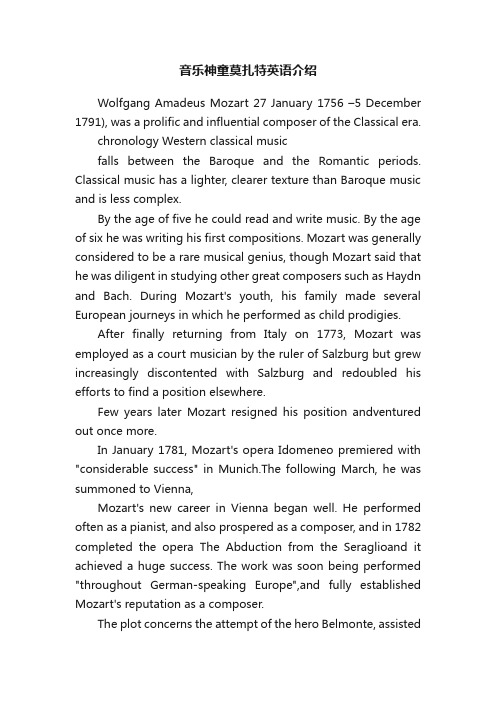
音乐神童莫扎特英语介绍Wolfgang Amadeus Mozart 27 January 1756 –5 December 1791), was a prolific and influential composer of the Classical era.chronology Western classical musicfalls between the Baroque and the Romantic periods. Classical music has a lighter, clearer texture than Baroque music and is less complex.By the age of five he could read and write music. By the age of six he was writing his first compositions. Mozart was generally considered to be a rare musical genius, though Mozart said that he was diligent in studying other great composers such as Haydn and Bach. During Mozart's youth, his family made several European journeys in which he performed as child prodigies.After finally returning from Italy on 1773, Mozart was employed as a court musician by the ruler of Salzburg but grew increasingly discontented with Salzburg and redoubled his efforts to find a position elsewhere.Few years later Mozart resigned his position andventured out once more.In January 1781, Mozart's opera Idomeneo premiered with "considerable success" in Munich.The following March, he was summoned to Vienna,Mozart's new career in Vienna began well. He performed often as a pianist, and also prospered as a composer, and in 1782 completed the opera The Abduction from the Seraglioand it achieved a huge success. The work was soon being performed "throughout German-speaking Europe",and fully established Mozart's reputation as a composer.The plot concerns the attempt of the hero Belmonte, assistedby his servant Pedrillo, to rescue his beloved Konstanze from the seraglio of Pasha Selim.In December 1784, Mozart became a Freemason. Freemasonry played an important role in the remainder of Mozart's life:Around the end of 1785, Mozartbegan his famous operatic collaboration with the librettist Lorenzo Da Ponte. 1786 saw the successful premiere of The Marriage of Figaro in Vienna. Its reception in Prague later in the year was even warmer, and this led to a second collaboration with Da Ponte: the opera Don Giovanni.The two are among Mozart's most important works and are mainstays of the operatic repertoire today.It tells how the servants Figaro and Susanna succeed in getting married, foiling the efforts of their philandering employer Count Almaviva to seduce Susanna and teaching him a lesson in fidelity.Don Giovann is an opera in two acts based on the legends of Don Juan, a fictional libertine and seducer.Mozart's musicstands as an archetype of the Classical style. At the time he began composing, European music was dominated by the style galant. Progressively, and in large part at the hands of Mozart himself, the contrapuntal complexities of the late Baroque emerged once more, moderated and disciplined by new forms.The central traits of the Classical style are all present in Mozart's music. Clarity, balance, and transparency are the hallmarks of his work, but simplistic notions of its delicacy mask the exceptional power of his finest masterpieces, such as the Piano Concerto No. 24 in C minor, K. 491; the Symphony No. 40 in G minor, K. 550.As Mozart matured, he progressively incorporated more features adapted from the Baroque. The influence of the Sturm und Drang ("Storm and Stress") period in music, with its brief foreshadowing of the Romantic era, is evident in the music of both composers at that time,Symphony No. 25 in G minor K. 183 is an excellent example.Mozart would sometimes switch his focus between operas and instrumental music. He produced operassuch as The Marriage of Figaro, Don Giovanni, and Die Zauberfl?te.In the opera the Queen of the Night persuades Prince T amino to rescue her daughter Pamina from captivity under the high priest Sarastro; instead, he learns the high ideals of Sarastro's community and seeks to join it. Separately, then together, Tamino and Pamina undergo severe trials of initiation, which end in triumph, with the Queen vanquished. The earthy Papageno, who accompanies Tamino on his quest, fails the trials completely but is rewarded anyway with the hand of his ideal female companion Papagena.。
莫扎特英语介绍生平
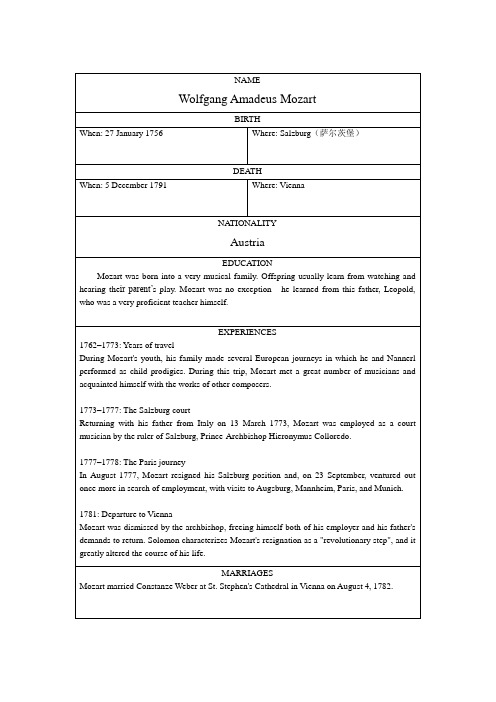
Mozart married Constanze Weber at St. Stephen's Cathedral inViennaon August 4, 1782.
CHILDREN/FAMILY LIFE
The couple had six children, of which only two survived infancy:
莫扎特生平莫扎特介绍ppt莫扎特英文介绍生平简介英语莫扎特莫扎特的介绍介绍莫扎特莫扎特传莫扎特胎教音乐莫扎特钢琴曲
NAME
Wolfgang Amadeus Mozart
BIRTH
When:27 January 1756
Where:Salzburg(萨尔茨堡)
DEATH
When:5 December 1791
1777–1778: TheParisjourney
In August 1777, Mozart resigned hisSalzburgposition and, on 23 September, ventured out once more in search of employment, with visits toAugsburg,Mannheim,Paris, andMunich.
ACCOMPLISHMENTS
He was a child prodigy who wrote his first symphony at age 8, then grew into a prolific adult who wrote over 600 pieces of music. Among his most famous works are Eine kleine Nachtmusik (A Little Night Music, 1787) and the operas Don Giovanni (1787) and Die Zauberflote (The Magic Flute, 1791). Mozart's music has appeared in approximately 310 feature films.600 works include 41 symphonies, 27 piano concertos, 16 operas, 19 piano sonatas, and other orchestral and chamber works.
英语故事-Wolfgang Amadeus Mozart

英语故事Wolfgang Amadeus Mozart享誉世界的音乐天才、“音乐神童”莫扎特简介Wolfgang Amadeus MozartIntroductionBorn Salzburg, 27 January 1756; died Vienna, 5 December 1791. Son of Leopold Mozart.He showed musical gifts at a very early age, composing when he was five and when he was six playing before the Bavarian elector and the Austrian empress. Leopold felt that it was proper, and might also be profitable, to exhibit his children’s God-given genius (Maria Anna, “Nannerl”, 1751–1829, was a gifted keyboard player): so in mid-1763 the family set out on a tour that took them to Paris and London, visiting numerous courts en route. Mozart astonished his audiences with his precocious skills; he played to the French and English royal families, had his first music published and wrote his earliest symphonies. The family arrived home late in 1766; nine months later they were off again, to Vienna, wherehopes of having an opera by Mozart performed were frustrated by intrigues.They spent 1769 in Salzburg; 1770–73 saw three visits to Italy, where Mozart wrote two operas (Mitridate, Lucio Silla) and a serenade for performance in Milan, and acquainted himself with Italian styles. Summer 1773 saw a further visit to Vienna, probably in the hope of securing a post; there Mozart wrote a set of string quartets and, on his return, wrote a group of symphonies including his two earliest, nos.25 in g Minor and 29 in A, in the regular repertory. Apart from a journey to Munich for the premiere of his opera La finta giardiniera early in 1775, the period from 1774 to mid-1777 was spent in Salzburg, where Mozart worked as Konzertmeister at the Prince-Archbishop’s court; his works of these years include masses, symphonies, all his violin concertos, six piano sonatas, several serenades and divertimentos and his first great piano concerto, K271.In 1777 the Mozarts, seeing limited opportunity in Salzburg for a composer so hugely gifted, resolved to seek a post elsewhere for Wolfgang. He was sent, with his mother, to Munich and to Mannheim, but was offered no position (though he stayed over four months at Mannheim, composing for pianoand flute and falling in love with Aloysia Weber). His father then dispatched him to Paris: there he had minor successes, notably with his Paris Symphony, no.31, deftly designed for the local taste. But prospects there were poor and Leopold ordered him home, where a superior post had been arranged at the court. He returned slowly and alone; his mother had died in Paris. The years 1779–80 were spent in Salzburg, playing in the cathedral and at court, composing sacred works, symphonies, concertos, serenades and dramatic music. But opera remained at the centre of his ambitions, and an opportunity came with a commission for a serious opera for Munich. He went there to compose it late in 1780; his correspondence with Leopold (through whom he communicated with the librettist, in Salzburg) is richly informative about his approach to musical drama. The work, Idomeneo, was a success. In it Mozart depicted serious, heroic emotion with a richness unparalleled elsewhere in his works, with vivid orchestral writing and an abundance of profoundly expressive orchestral recitative.Mozart was then summoned from Munich to Vienna, where the Salzburg court was in residence on the accession of a new emperor. Fresh from his success, he found himself placed between the valets and the cooks; his resentment towards hisemployer, exacerbated by the Prince-Archbishop’s refusal to let him perform at events the emperor was attending, soon led to conflict, and in May 1781 he resigned, or was kicked out of, his job. He wanted a post at the Imperial court in Vienna, but was content to do freelance work in a city that apparently offered golden opportunities. He made his living over the ensuing years by teaching, by publishing his music, by playing at patrons’ houses or in public, by composing to commission (particularly operas); in 1787 he obtained a minor court post as Kammermusicus, which gave him a reasonable salary and required nothing beyond the writing of dance music for court balls. He always earned, by musicians’ standards, a good income, and had a carriage and servants; through lavish spending and poor management he suffered times of financial difficulty and had to borrow. In 1782 he married Constanze Weber, Aloysia’s younger sister.In his early years in Vienna, Mozart built up his reputation by publishing (sonatas for piano, some with violin), by playing the piano and, in 1782, by having an opera performed: Die Entführung aus dem Serail, a German Singspiel which went far beyond the usual limits of the tradition with its long, elaborately written songs (hence Emperor Joseph II’s famousobservation, “Too many notes, my dear Mozart”). The work was successful and was taken into the repertories of many provincial companies (for which Mozart was not however paid). In these years, too, he wrote six string quartets which he dedicated to the master of the form, Haydn: they are marked not only by their variety of expression but by their complex textures, conceived as four-part discourse, with the musical ideas linked to this freshly integrated treatment of the medium. Haydn told Mozart’s father that Mozart was “the greatest composer known to me in person or by name; he has taste and, what is more, the greatest knowledge of composition”.In 1782 Mozart embarked on the composition of piano concertos, so that he could appear both as composer and soloist. He wrote 15 before the end of 1786, with early 1784 as the peak of activity. They represent one of his greatest achievements, with their formal mastery, their subtle relationships between piano and orchestra (the wind instruments especially) and their combination of brilliance, lyricism and symphonic growth. In 1786 he wrote the first of his three comic operas with Lorenzo da Ponte as librettist, Le nozze di Figaro: here and in Don Giovanni (given in Prague, 1787) Mozart treats the interplay of social and sexual tensions with keen insight intohuman character that—as again in the more artificial sexual comedy of Cosi fan tutte (1790)—transcends the comic framework, just as Die Zauberflote (1791) transcends, with its elements of ritual and allegory about human harmony and enlightenment, the world of the Viennese popular theatre from which it springs.Mozart lived in Vienna for the rest of his life. He undertook a number of journeys: to Salzburg in 1783, to introduce his wife to his family; to Prague three times, for concerts and operas; to Berlin in 1789, where he had hopes of a post; to Frankfurt in 1790, to play at coronation celebrations. The last Prague journey was for the premiere of La clemenza di Tito (1791), a traditional serious opera written for coronation celebrations, but composed with a finesse and economy characteristic of Mozart’s late music. Instrumental works of these years include some piano sonatas, three string quartets written for the King of Prussia, some string quintets, which include one of his most deeply felt works (K516 in g Minor) and one of his most nobly spacious (K515 in C), and his last four symphonies—one (no.38 in D) composed for Prague in 1786, the others written in 1788 and forming, with the lyricism of no.39 in E-flat, the tragic suggestiveness of no.40 in g Minorand the grandeur of no. 41 in C, a climax to his orchestral music. His final works include the Clarinet Concerto and some pieces for masonic lodges (he had been a freemason since 1784; masonic teachings no doubt affected his thinking, and his compositions, in his last years). At his death from a feverish illness whose precise nature has given rise to much speculation (he was not poisoned), he left unfinished the Requiem, his first large-scale work for the church since the c Minor Mass of 1783; a completion by his pupil Süssmayr was long accepted as the standard one but there have been recent attempts to improve on it. Mozart was buried in a Vienna suburb, with little ceremony and in an unmarked grave, in accordance with prevailing custom.。
- 1、下载文档前请自行甄别文档内容的完整性,平台不提供额外的编辑、内容补充、找答案等附加服务。
- 2、"仅部分预览"的文档,不可在线预览部分如存在完整性等问题,可反馈申请退款(可完整预览的文档不适用该条件!)。
- 3、如文档侵犯您的权益,请联系客服反馈,我们会尽快为您处理(人工客服工作时间:9:00-18:30)。
1777–1778: TheParisjourney
In August 1777, Mozart resigned hisSalzburgposition and, on 23 September, ventured out once more in search of employment, with visits toAugsburg,Mannheim,Paris, andMunich.
INTERESTING FACTS
He enjoyed billiards and dancing (see Mozart and dance), and kept pets: a canary, a starling,,a dog, and also a horse for recreational riding.
MARRIAGES
Mozart married Constanze Weber at St. Stephen's Cathedral inViennaon August 4, 1782.
CHILDREN/FAMILY LIFE
The couple had six children, of which only two survived infancy:
PROBLEMS
poor & illness
By mid-1788, Mozart and his family had moved from centralViennato the suburb of Alsergrund.Mozart began to borrow money, most often from his friend and fellow Mason Michael Puchberg; "a pitiful sequence of letters pleading for loans" survives.Maynard Solomon and others have suggested that Mozart was suffering from depression, and it seems that his output slowed.
NAME
Wolfgang Amadeus Mozart
BIRTH
When:27 January 1756
Where:Salzburg(萨尔茨堡)
DEATH
When:5 December 1791
Where:Vienna
NATIONALITY
Austria
EDUCATION
Mozart was born into a very musical family. Offspring usually learn from watching and hearing their parent’splay. Mozart was no exception - he learned from this father, Leopold, who was a very proficient teacher himself.
Theresia Constanzia Adelheid Friedericke Maria Anna (27 December 1787 – 29 June 1788)
Anna Maria (died soon after birth, 25 December 1789)
Franz Xaver Wolfgang Mozart (26 July 1791 – 29 July 1844)
ACCOMPLISHMENTS
He was a child prodigy who wrote his first symphony at age 8, then grew into a prolific adult who wrote over 600 pieces of music. Among his most famous works are Eine kleine Nachtmusik (A Little Night Music, 1787) and the operas Don Giovanni (1787) and Die Zauberflote (The Magic Flute, 1791). Mozart's music has appeared in approximately 310 feature films.600 works include 41 symphonies, 27 piano concertos, 16 operas, 19 piano sonatas, and other orchestral and chamber works.
Raimund Leopold (17 June – 19 August 1783)
Karl Thomas Mozart (21 September 1784 – 31 October 1858)
Johann Thomas Leopold (18 October – 15 November 1786)
1773–1777: The Salzburg court
Returning with his father fromItalyon 13 March 1773, Mozart was employed as a court musician by the ruler ofSalzburg, Prince-Archbishop Hieronymus Colloredo.
1781: Departure toVienna
Mozart was dismissed by the archbishop, freeing himself both of his employer and his father's demands to return.Solomon characterizes Mozart's resignation as a "revolutionary step", and it greatly altered the course of his life.
EБайду номын сангаасPERIENCES
1762–1773: Years of travel
During Mozart's youth, his family made several European journeys in which he and Nannerl performed as child prodigies.During this trip, Mozart met a great number of musicians and acquainted himself with the works of other composers.
